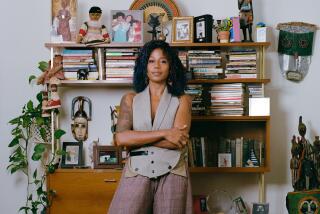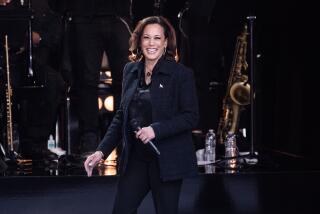First Lady Celebrates Harlem Renaissance
- Share via
WASHINGTON — The White House’s stately East Room seemed more like an intimate salon Wednesday as First Lady Laura Bush played host to a lively discussion of the literary and cultural legacy of the Harlem Renaissance.
Surrounded by massive chandeliers, formal portraits of former White House occupants and ornate draperies, about 150 scholars, teachers, students and other literature lovers were treated to a three-hour retrospective on the prolific, Harlem-based black arts movement of the 1920s and ‘30s.
Mrs. Bush, a former librarian who has made teaching and early childhood development her signature issues, noted that the historic heart of African American culture provided a “welcome haven” where blacks fleeing the racism of the South could find well-paying jobs, have fun and write what they wanted.
“The writers of the Harlem Renaissance whom we focus on today celebrated their culture in poetry and prose while capturing the stark realities of being black in America,” she said. “In committing their words to paper, they shaped a rich literary history and became agents of change.”
The event included lectures by noted literary experts and a panel discussion by modern black writers about the influences on their work of their early 20th century predecessors, with afternoon tea served in between.
A local high school choir filled the room with period music. Photographs, musical playbills, poem drafts and other artifacts on loan from the Library of Congress also were strewn throughout the executive mansion’s public rooms.
Attendees included Lucy Hurston, niece of novelist Zora Neale Hurston, who was celebrated alongside fellow Harlem Renaissance writers such as Langston Hughes, W.E.B. Du Bois, Claude McKay, Countee Cullen and Jean Toomer.
It was the second in a series of symposiums being held by Mrs. Bush to salute America’s greatest authors. The Harlem Renaissance was supposed to coincide with February’s Black History Month, but scheduling difficulties delayed the event.
The Harlem Renaissance transformed American letters. But it also shaped social history, helping to shift the country from Victorianism to modernism, said Pulitzer Prize-winning writer David Levering Lewis.
“They were part of . . . a creation of new modernity, one in which race and African ancestry would not be a badge of shame and not an impediment to full freedom,” said Thadious Davis, an English professor at Vanderbilt University.
More to Read
Sign up for our Book Club newsletter
Get the latest news, events and more from the Los Angeles Times Book Club, and help us get L.A. reading and talking.
You may occasionally receive promotional content from the Los Angeles Times.









